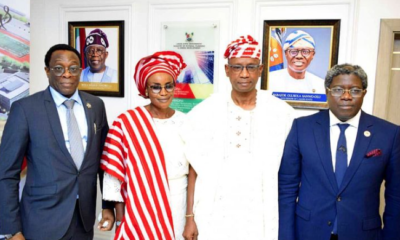Education
Tokunbo Wahab: An uncommon legal eagle soaring daily to a greater place in history


By Victor Ojelabi
It amazes many how some politicians quickly gather court-like followership that often transcends their generation. Why would the likes of Winston Churchill, D. Roosevelt, Nelson Mandela and the sage himself, Awolowo still command so much respect, many years after their death? Beyond oratory, these figures have an underlining nature of selflessness, deft wisdom and uncommon abilities to get things done and always for the greater good of the society. Politicians in this class live their lives pursuing the dream of a fair and prosperous society so much that it becomes the only image the people hold of them.
One Nigerian political figure that is fast assuming that status is the Special Adviser on Education to the Executive Governor of Lagos State, Barr. Tokunbo Philip Wahab, whose partisan political journey is only short of a decade.
Like the Legends of People Service that were mentioned above, the endearment to the TW brand cascades from his many years in legal practice and private business. And those very close to him often attest that it is his unsatisfied desire to scale up the impact of his programmes for the betterment of the lots of the majority that drove him into active public service. The TW brand that is fast becoming associated with landmark long-term sustainable development projects is one that both the masses and the political class have become connected to.
Though, political kinship these days, particularly in a nation like Nigeria, has been commoditized. Whereby wealthy individuals purchase a crowd of supporters and induce loyalty with cheap gifts and bonded favours with thousands chanting their praises because of basic handouts without a deep relation with their values, vision and personality, the soaring followership of TW is by every yard organic, because there is value-based image and his personality, vision and performance easily command bountiful followership.
Leadership positions, the finality of politics and politicking, is a basic output of a life that is predisposed to the nature of selfless service, where the pursuit of the happiness and fulfillment of the other person is always the focus of the leader. This naturally makes more and more people voluntarily put their interests, goals, aspirations, voice and rights in the hands of that individual. The growing attraction to Tokunbo Wahab is easily traceable to his natural ability to indeed lead, gaining tremendous trust and support from all corners and strata of the society!
TW is an amiable leadership brand in the eyes of a lot of people who follow the development of Lagos State. His outlandish impact in the last 3years have drawn a lot of people to him, placed him the radar of progressive governance watchers, sparked curiosity amongst the gentlemen of the press, endeared validity amongst educationist and futurists, placed dignity in the office he occupies, which hitherto was not a highly reckoned position in the large scheme of things in the state.
In 2019, when Babajide Sanwo-Olu struck the right chord by calling TW to join his team in pursuing the THEMES agenda with a major emphasis on education, no one could have imagined what the next three years held for Lagos educational sector.
Here are we in 2022, with accelerated transformation, modernization and diligent purposing of all the fundamental aspects of education in Lagos State to meet the immediate needs and drive the future development of not only the state, but the entire West African region. Now at the brink of another election, if all BOS’ government will judged by are the successes in this sector, a second term ticket will not only be deserving but worth championing by the common man.
Education is said to be an organized mechanism through which society develops its human resources by equipping them with desirable knowledge, skills, attitudes and values which will enable them operate the social institutions of a given country or nation effectively. The state and future of a state is directly proportional to the investment put into quality education of her people.
By TW’s standard, quality means global competiveness. Hence, the use of his office to design and promote a new benchmark and objectives for the substructures of the sector and their managed institutions. LASU’s sporadic climb to the top tier lists of universities in the world, first-of-its-kind training of the heads and management of the state top educational institutions at the University of London, future-proofing programme to digitize libraries across primary, secondary and tertiary institutions across Lagos state are products of a resolve to put Lagos at an advantaged position now and in the future of a rapidly changing and globalised world.
William F. Buckley once said, “I would rather be governed by the first 2,000 people in the telephone directory, than by the Harvard University faculty.”
Of course, this speaks to elitism and how the common person in many ways is superior and better at politics for the good of the people they govern. The philosophy around this is the associative tendencies of experiencing the worst of a society, where the common person can relate with plight of the ordinary man.
A Tokunbo Wahab would perfectly fit into the class of an elite, having enjoyed world-class education in the prestigious Harvard Kennedy School of Governance and Wharton University of Pennsylvania, amongst other things. Just like majority of the ruling class, he’s expected to be classist in approach to leadership and governance – more given to personal ambitions and protecting of the power block.
But for his aggressive drive for the liberation of the people through quality education, one is easily reminded of his humble beginnings and attestable progress through life’s success mountains. From public schools in Epe to polytechnic in Ogun, University of Benin and with such experiences which has apparently formed his appreciative disposition to power, TW connects the divide between the government and the governed, the powerful leader and the common man in many ways deserving of a case study in political science.
So it was quite deserving when Wahab emerged the Most Outstanding Thought Leader in Education at the maiden edition of TheFLEA Awards.
According to the awards organisers, the desire to create thought leadership category in key sectors is to acknowledge exceptional personalities making real impact in the lives of the common man in the society.
“In our consideration of suitable candidates in education, we made deliberate effort to review the roles of several non-mainstream political figures – elected office holders, whose major projects are often powered by behind-the-scenes think tanks. Our very vast team indexed quite a number of public servants who fit into our model and after several considerations concluded on awarding it to you based on Eko Digital Initiative and Overall Transformation of Lagos Education,” the award committee revealed.
As Tokunbo Wahab turns 50, majority of his adherent supporters across the world, those he has impacted directly through his programmes, and those he has inspired by his performance and personality, firms up their gaze to the sky to watch this soaring legal eagle glide higher in the ranks, for the sake of our future as a people.
Education
Shettima Launches NEDC-ASSEP Programme To Address School Dropouts In North East


Vice President Senator Kashim Shettima yesterday launched the Accelerated Senior Secondary School Education Programme (ASSEP) initiated by the North-East Development Commission (NEDC) in collaboration with the Vice President Office to reduce the number of post-primary dropouts due to the decline in secondary school enrollment in the subregion which stands at 15 percent, one of the lowest in the country.
Read Also: NLC Shuts Down IBEDC Premises Over Electricity Tariff Hike
The managing director/CEO of the commission, Alh Mohammed Alkali said the Stabilisation and Development Master Plan (NERSDMP) developed by the North East Development Commission and its diverse partners consists of pillars that support human capital development in the subregion which caters for both human capital facilities – infrastructure, teaching/learning material, etc – estimated to cost over N1 trillion.
Alkali made the remark at the launching of the Accelerated Senior Secondary School Education Programme (ASSEP) performed in Bauchi on Saturday by the vice president.
ASSEP seeks to boost the post-primary education rating across the subregion through three major objectives – improved enrolment into tertiary institutions, skills development and elevation of teacher quality.
Alh Alkali assured that the commission is poised to develop and support the children and youth of the Northeast subregion to grow, develop and compete with the best across the world in various fields, excel and contribute to further development of the six states, subregion and country as a whole.
The managing director expressed gratitude to the federal government, especially the vice president, for the deep interest and commitment to human development in the North-East, saying they would be counting on the continued support of state governments, federal government as well as other partners.
Alkali disclosed that the commission has also plowed other funds into human capital training and retraining programmes that could propel socio-economic development of the subregion, saying “This underscores the premium we place on building our people and their capacity to make concrete social and economic contribution.
“Therefore, the Accelerated Senior Secondary Education Programme (ASSEP) we have gathered here to launch today is an intervention focused on addressing a particular challenge in our region’s education system; it will provide effective support where the capacity of conventional schooling arrangements is limited for our teeming beneficiaries.”
He attributed this to the challenges in the post-primary education segment, citing JAMB/UTME applications and admissions into tertiary institutions in 2019 where northeast students’ performance was one of the poorest in the country.
He further noted that nationally, the North-East subregion has the lowest number of teachers and the highest percentage (55 percent of those available) are without literacy skills.”
Vice President Shettima had earlier launched the programme regretting that post primary enrolment in the Northeast is 19 percent which is far below the national average of 39 percent.
Education
Oyo State Governor Approves Recruitment of 7,000 Primary School Teachers


Governor Seyi Makinde of Oyo State has approved the recruitment of 7,000 teachers into public primary schools in the state.
The government also approved the recruitment of 100 caregivers in special schools across the state.
Read Also: Osun State: NNPP Vows To Unseat Adeleke In 2026
Nureni Adeniran, the Oyo State Universal Basic Education Board (SUBEB) chairman, disclosed this in Ibadan on Friday at a news conference.
Mr Adeniran said this was in fulfilment of Mr Makinde’s electioneering promise and fulfilment of the yearnings of the people of the state.
He explained that the recruitment process would commence soon, urging intending applicants to be wary of scammers who defraud unsuspecting members of the public.
Mr Adeniran said information regarding the recruitment exercise would only emanate from the board, adding that no authorization had been given to a third party to act on behalf of the government or the board.
The SUBEB boss said the intending applicants would not pay any amount to anybody on account of the recruitment.
“This press conference is the first stage of the recruitment process; the next stage will be made known as well as the requirements.
“The board will comply with the directive of the governor that the exercise will be conducted based on merit,” Mr Adeniran said.
He, however, urged intending applicants to apply based on their local government areas, adding that teachers would be posted to teach there.
According to him, it will solve the problem of having to transfer teachers later and ensure that every local government is adequately catered for.
He said the recruitment would address about 70 per cent of the manpower shortage.
He added that the exercise would be inclusive, with special consideration for persons with disabilities.
(NAN)
Education
Kwara State Government Issues Stern Warning to School Principals Over Illegal Charges


The Kwara State Government has cautioned principals of Junior Secondary Schools and head teachers of primary schools throughout the state against imposing unlawful fees for the state placement examination (Common Entrance).
Read Also: I Have No Hand In Shaibu’s Impeachment – Ighodalo
Hajia Sa’adatu Modibbo Kawu, the state Commissioner for Education and Human Capital Development, delivered the warning on Tuesday from her office in Ilorin.
She stressed that the common entrance examination is free of charge and firmly stated that the government will not tolerate any form of extortion from pupils under any pretext, as the examination is fully funded by the state government.
Hajia Modibbo Kawu urged school principals and head teachers to refrain from engaging in activities that could tarnish the reputation of the state government.
Additionally, she cautioned against involvement in or condoning examination malpractices, asserting that the current administration has a zero-tolerance policy towards such acts.
The commissioner encouraged parents and guardians to promptly report any principal or head teacher suspected of engaging in questionable activities directly to her office, reiterating that her office is open to all concerned parties.
-



 Entertainment1 year ago
Entertainment1 year agoThe Story Of A Woman With Unusual Long Backside, Sarah Baartman
-



 Entertainment1 year ago
Entertainment1 year agoTallest Man In Nigeria Afeez Agoro Cries Out To Nigerians For Financial Support After Chronic Arthritis Diagnosis As SFCOBA 94Set Pays Him Visit
-



 Business2 years ago
Business2 years agoNigeria Vs Ghana: Authentic Nigeria Football and Allied Sports Supporters Club Seals Sponsorship Deal with 86Z Football Technology Limited Foots
-



 News8 months ago
News8 months agoPhysical Planning Commissioner, Oluyinka Olumide Assumes Office …Harps On Transparency, Zero Tolerance To Building Collapse
-



 Featured1 year ago
Featured1 year agoBuruj Football Club’s Players Moving To Europe Delights Obesere
-



 Sports11 months ago
Sports11 months agoVictor Osimhen Returns To Roots As Football Superstar Visits Primary School And Inspires Young Talent
-



 Featured2 years ago
Featured2 years agoQatar 2022 World Cup Playoff: Black Stars Hold Eagles To Scoreless Draw In Kumasi
-



 Sports11 months ago
Sports11 months agoSoname Praises Monimitchelle On Mobolaji Johnson Pitch… Says It Enabled Teams To Play Beautiful Football




